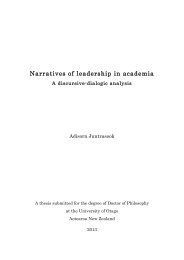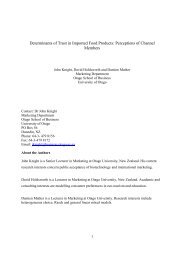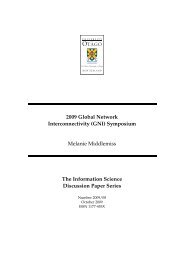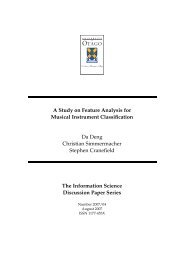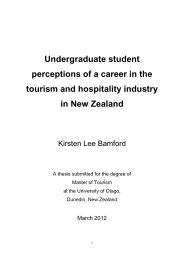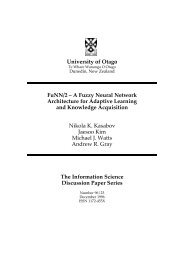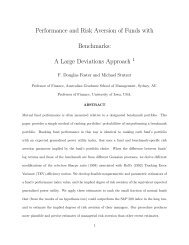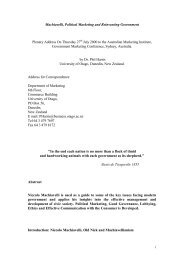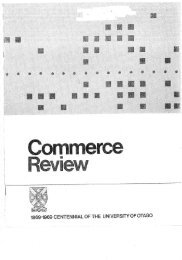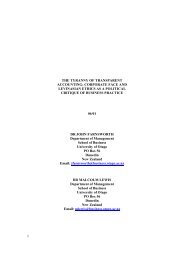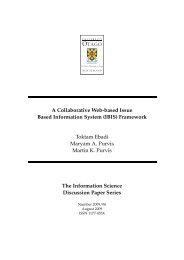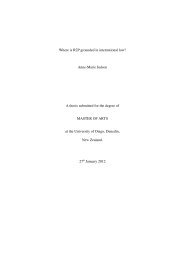University of Otago Cadastral - Otago University Research Archive
University of Otago Cadastral - Otago University Research Archive
University of Otago Cadastral - Otago University Research Archive
You also want an ePaper? Increase the reach of your titles
YUMPU automatically turns print PDFs into web optimized ePapers that Google loves.
1<br />
community, village or family is not a corporate entity in law, but merely a<br />
society or collection <strong>of</strong> persons with a common interest in land, all <strong>of</strong><br />
whom are jointly, severally and directly liable for debts properly incurred<br />
on behalf <strong>of</strong> the land. [Nwabueze 1972, 53-54]<br />
Another important feature <strong>of</strong> traditional land tenure are the variations in the rights and<br />
concepts which exist in different localities. In some traditional societies, land w a s<br />
considered a natural endowment in the same category<br />
as rain, sunlight and the air we<br />
b r e a t h e [Moyana 1984, l3]. Because <strong>of</strong> this view <strong>of</strong> land, it has been held by some<br />
writers that sale <strong>of</strong> land was forbidden. However, there is a more convincing argument<br />
that t h o uoutright g h alienation was uncommon in the past, it was not positively forbidden<br />
by customary l a w [Nwabueze 1972, 551. Moyana [l984, 13] suggests<br />
that there was n o<br />
limit to the amount <strong>of</strong> land one could cultivate as land was always available in large<br />
q u a n t i t iThe e s . population <br />
was scant then and the needs <strong>of</strong> the community<br />
simple and concerned mostly<br />
with subsistence.<br />
then were<br />
Another reason why alienation <strong>of</strong> communal land was not encouraged<br />
was due to the<br />
fluctuating and mythical constitution <strong>of</strong> the community, village or family. Okoro [1966]<br />
reports that Gboteyi, the Elesi <strong>of</strong> Odogbolu testified that l a n d belongs to a vast family <strong>of</strong><br />
which many<br />
are dead, few are living<br />
and countless members are still u n b o r n . A <br />
view is expressed by Sarbah on Fanti (Ghana) customary law:<br />
customary law says they who are born and they<br />
who are still in the<br />
womb require means <strong>of</strong> support, where<strong>of</strong> the family land and possessions<br />
must not be wasted or squandered.[Sarbah, quoted in Okoro 1966, 3]<br />
similar<br />
An important point <strong>of</strong> difference between various communities is the concept <strong>of</strong> ownership<br />
and <strong>of</strong> what is owned. Still following from the concept <strong>of</strong> land as natural endowment, it<br />
was sometimes a s s o c i a t ewith d sacredness as such Shona terms as p a s i c h i and g a r e <br />
D z i v a gwhich u r u <br />
are commonly used in Shona religious circles would s u g g e[Moyana<br />
s t <br />
1984, 13). In Nigeria, land was the subject <strong>of</strong> allodial or absolute ownership,<br />
to qualified ownerships or estates in English law. However, the Privy<br />
that the temi ownership is loosely<br />
in contrast<br />
Council observed<br />
used in West Africa: S o m e t i m eitsdenotes what is in<br />
effect absolute ownership; at other times it is used in a context which indicates that the<br />
reference is only to rights <strong>of</strong> o c c u p a n{Nwabueze c y 1972, 26). Also, because <strong>of</strong> the<br />
communal nature <strong>of</strong> the ownership, and the rights <strong>of</strong> future generations, whatever right a<br />
group has in land is infinite and perpetualin duration.<br />
7



